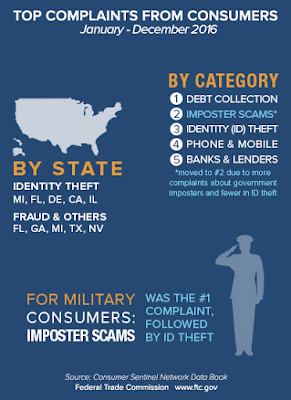Consumer protection covers a wide variety of state and federal complaints. Find out what the top 10 consumer protection complaints in Michigan were in 2016, and how the state stacks up to the rest of the country.
Michigan Top 10 Consumer Protection Complaints
On Monday, March 6, 2017, in honor of National Consumer Protection Week, Michigan Attorney General Bill Schuette announced the top 10 consumer complaints received by his office in 2016:-
Credit and financial concerns
-
Telecommunications, cable, and satellite TV (including
telemarketing)
-
Motor vehicles and automobiles
-
Retail
-
Internet (including online purchases)
-
Personal service providers
-
Landlord and tenant
-
Contractors
-
Health service providers
-
Gasoline, fuel, and energy
Michigan Tops Federal Complaints for Identity Theft, Fraud
The Federal Trade Commission also released its Annual Summary of Consumer Complaints recently. On March 3, 2017, the summary revealed that Michigan had the highest numbers of federal identity theft claims nationwide. And that is in the face of a 3% drop in identity theft complaints nationwide (from 16% of all consumer complaints in 2015 to 13% in 2016).Among federal fraud and other complaints, Michigan was third, after Florida and Georgia. Nationwide, the Consumer Sentinel Network recorded the top 5 consumer complaints:
-
Debt collection
-
Imposter scams
-
Identity theft
-
Phone and mobile
-
Banks and lenders
“Our latest data book shows that imposter scams are a serious and growing problem, and you can be sure that the FTC will use all the tools at its disposal to address it. . . . That includes law enforcement actions against scammers and consumer education to help consumers avoid losing money.”Consumers should be wary of any caller asking for money, especially paid via wire transfer. The FTC warns that the government will never ask you to wire money and it is illegal for telemarketers to do so. Protect yourself and your identity. Never agree to pay money to a government entity over the phone or email.
If you think you have been the victim of identity theft or consumer fraud, a consumer protection attorney can help. Contact attorney Dani K. Liblang of the Liblang Law Firm, P.C., in Birmingham, Michigan for a free consultation.



No comments:
Post a Comment